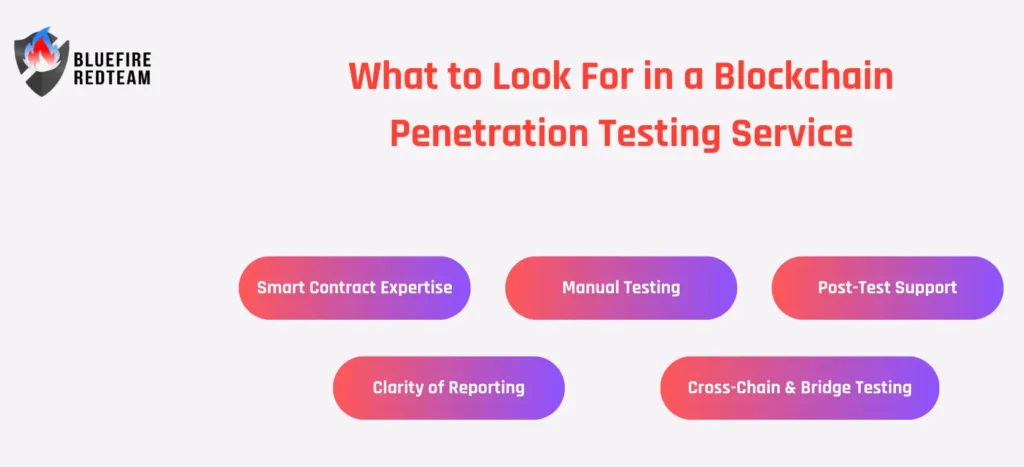Blockchain vulnerabilities are keeping up with Web3’s rapid growth. It is now imperative to secure your decentralised applications, as DeFi exploits cost over $1.8 billion in 2024 alone (Immunefi).
Blockchain penetration testing services are now essential for every serious Web3 project.
This 2025 review breaks down the top blockchain pentest providers and helps you choose the right one for your project’s scale, complexity, and risk profile.
What to Look For in a Blockchain Penetration Testing Service
Not all pentest services are created equal. Here’s what to prioritize:

- Smart Contract Expertise: Deep experience with Solidity, Vyper, and emerging L1/L2 frameworks.
- Manual Testing: Tools can help, but manual, attacker-mindset analysis is essential.
- Cross-Chain & Bridge Testing: Vulnerabilities often arise in multi-chain logic.
- Clarity of Reporting: Actionable, severity-ranked reports with proof-of-concepts.
- Post-Test Support: The best firms include remediation validation and retesting.
Top Blockchain Penetration Testing Providers in 2025
1. Bluefire Redteam – Best for high-touch, high-risk Web3 projects

Bluefire Redteam is an expert in red team-style blockchain testing for cross-chain platforms, DeFi protocols, and mission-critical dApps. Their hybrid testing approach blends real-world exploit simulation, customised threat modelling, and sophisticated manual analysis.
Why Choose Bluefire:
- Comprehensive testing across smart contracts, nodes, and dApp frontends
- Dedicated remediation calls with engineers
- Quick turnaround and retesting support
Ideal For: High-value DeFi apps, DAO governance systems, Layer 2s
2. Trail of Bits – Best for protocol-level audits
A premier company that specialises in thorough audits of cryptographic systems and base-layer protocols. Perfect for core development teams and foundations.
3. OpenZeppelin – Best for Solidity smart contract audits
Leaders with a vast open-source toolchain in the development of secure smart contracts. Excellent for Solidity-based projects.
4. Halborn – Best for enterprise-scale Web3 security
Renowned for large-scale testing and enterprise-friendly procedures. Excellent for fintech crossovers or big Web3 businesses.
5. Least Authority – Best for privacy-focused blockchain projects
Focusses on zero-knowledge-based projects, zk-apps, and privacy protocols.
Pricing Breakdown & ROI of Blockchain Penetration Testing
Blockchain penetration testing usually ranges from $5,000 to $50,000+ depending on:
- Number and complexity of smart contracts
- Protocol integrations (e.g., bridges, oracles)
- Timeline and depth of testing required
Compared to 7- or 8-figure potential losses, this is a low-cost insurance policy that also builds investor and user trust.
When to Pentest
- Before Launch: Catch vulnerabilities before attackers do
- Post Major Updates: After any contract or protocol changes
- After Funding Rounds: Investors expect due diligence
- Quarterly/Bi-Annually: As part of an ongoing security lifecycle
Conclusion
The strength of your blockchain security posture is determined by the results of your most recent test. Regular and thorough penetration testing is essential in the high-risk Web3 environment of 2025.
Out of all the providers, Bluefire Redteam is notable for its aggressive, hands-on strategy designed for intricate Web3 ecosystems. Make a call now to avoid the dangers of tomorrow.
FAQ: Choosing a Blockchain Pentest Provider
- How do I choose between different blockchain pentest companies?
Look for experience in your specific stack (e.g., EVM, Solana, Cosmos), clarity of reporting, manual vs. automated testing, and ongoing support.
- Is blockchain penetration testing only for DeFi apps?
No. Any dApp, NFT platform, Layer 2, or DAO that handles value or user data should consider penetration testing.
- What’s the difference between a smart contract audit and a blockchain pentest?
Audits focus on code correctness. Pentests simulate real-world attacks on the entire system including smart contracts, nodes, and integrations.
- Do these providers support retesting after fixes?
Yes, top firms like Bluefire Redteam and Halborn include retesting as part of their process.
- When should I schedule a pentest?
Ideally before launch, after major upgrades, and regularly (quarterly or bi-annually) for live projects.
- Which provider is best for cross-chain or bridge-based apps?
Bluefire Redteam and Halborn have strong reputations in this area due to their multi-layer threat modeling expertise.


